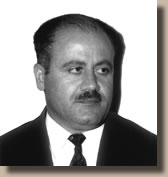
|
| Home | Biography | Publications | Documents & Photos | Contact | ||
APPENDIX 6COLONEL ABDALLAH AL-TAL
Colonel Abdallah Al-Tal (Aboul-Muntasser) (1918 - 1973) was a famous officer of the Arab Legion during the 1948-1949 Palestine war. The Legion’s Arabic name is “Al-Jaysh Al-Arabi”, i.e. The Arab Army. It was created by the British following the foundation of the Emirate of Transjordan, “Imarat Sharq El-Ordon”, in 1921, which is known today as the Hashemite Kingdom of Jordan. He held various commands throughout his relatively short military career, but was a Major, then Colonel and Military Governor of Jerusalem during the crucial days of the battle for the Holy city in 1948. Colonel Al-Tal hails from a famous and well respected Arab tribe spread between Jordan and other parts of the region. Its abode in Jordan is the area of Irbid in the north-western corner of the country. Colonel Al-Tal, a charismatic officer, who also loved music and had a beautiful voice, was an example of military aptitude and chivalry on the battleground, whether his troops were winning or losing battles. Several serious historians including among Israelis have written about him and his unblemished role during that war. Actually it is impossible to talk about the 1948 battle for Jerusalem without mentioning Colonel Abdallah Al-Tal. A DVD film entitled “O Jerusalem”, partially based on a book by the same name published in 1971 by Larry Collins and Dominique Lapierre, was released in Europe in October 2006 about the Battle of Qastal and the Battle involving the Jewish quarter in Jerusalem. The film partially portrays the roles played by Abdelqader Al-Husseini and Colonel Abdallah Al-Tal during those two battles respectively, which served as background for a story involving Palestinians and Jews. Military operations conducted by Colonel Al-Tal during the latter phases of the battle for Jerusalem during which he stepped up fire power against the Jewish forces were not sanctioned by the British Commander of the Arab Legion, Lieutenant-General John Bagot Glubb, better known as Glubb Pasha, who considered Colonel Al-Tal’s actions akin to insubordination. To avoid criticism by his fellow Arab rulers, King Abdallah I only hesitantly acquiesced with Colonel Al-Tal’s zealous initiatives. The King was already pursuing secret negotiations with some of the leaders of the Zionist movement and the Jewish Agency, namely Golda Meir, Moshe Sharett and Eliyahu Sassoon about getting a piece of Palestine for himself. Colonel Al-Tal’s military initiatives reflected the fact that he and his troops could not just stand by and watch the Palestinian population of Jerusalem defenceless at the mercy of enemy fire, while his King was plotting with that same enemy. Once a truce was signed between Jordan, the other Arab governments and the Jewish leadership, (The Palestinians were not part of the truce or any subsequent agreements.), King Abdallah I manifested his anger at Colonel Al-Tal’s initiatives, which could have jeopardized his plans. Ironically enough it was Colonel Al-Tal’s “insubordination” that saved the old city of Jerusalem for King Abdallah, otherwise it would have been captured by the Jewish Haganah forces in 1948. Perhaps the King was also becoming increasingly jealous of Al-Tal's growing popularity, because suddenly the latter was disingeniously accused of trying to seize power in Jordan in order to annex the kingdom to Syria. Instead of returning to his home-town and country as a hero, Al-Tal found himself compelled to seek asylum in Egypt, where he spent next to twenty years as a political refugee. In the final analysis, the battle for Jerusalem was in fact the only recorded significant Arab military victory during the entire 1948-1949 Palestine war. Colonel Al-Tal’s initiative had prevented the old city and some of its neighbourhoods from falling into the hands of the Haganah forces. Though the city and what had remained of Palestine did eventually fall to the Israelis following the 1967 war, commonly known as the “Six-day War”. Abdallah Al-Tal passed away in Jordan on August 13, 1973. He had six children; one girl named Inas, and five boys Montasser, Salah, Oussama, Khaled and Hamza. The close links between his family and that of Eltaher’s continue until now.Colonel Al-Tal published his memoirs “Karithat Falastin” (The Palestine Catastrophe) in Cairo in 1959. The book soon was out of print, but most of its essential contents were included in a subsequent book “Abdallah Al-Tal Batal Maaraket Al-Qods” (Abdallah Al-Tal: Hero of the Battle for Jerusalem).51 It was edited by his brother Dr. Ahmad Youssef Al-Tal and published in Amman in 1999. The two books were published in Arabic of course, but the Israelis, and possibly the British, must have produced Hebrew and/or English translations for their own purposes.
|
| © 2025 PHP: 8.0.30 Eltaher.org | Contact |
